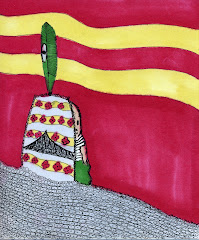Saturday, April 28, 2012
Borges-HIS END AND HIS BEGINNING
Sunday, March 25, 2012
ALVARO MUTIS




Alvaro Mutis has become one of my favorite writers. i'm posting a poem of his here and hope you enjoy it.
 Tequila
Tequila
 by Alvaro Mutis
by Alvaro Mutis
translated from the Spanish by Forrest Gander
—for María and Juan Palomar
Tequila is a clean flame that clambers up the walls
and shoots over tiled roofs, relief to despair.
Tequila isn’t for sailors
because it blurs the navigational instruments
and dismisses the wind’s tacit orders.
But tequila, on the other hand, enraptures those returning by train
and those driving the train, because it stays faithful
and blind in its loyalty to the rails’ parallel delirium
and to hurried greetings in the stations
where the train pauses to testify to
its inscrutable destination, errant, subject to the inevitable laws.
There are trees under whose shadow it is wonderful to drink it
with the parsimony of those who preach in wind
and other trees where tequila can’t stand the shade
that dims its powers and in whose branches it stirs up
a flower blue as the warnings on bottles of poison.
When tequila waves its fringed, serrated flag,
the battle halts and armies return
the order they intended to impose.
Often two squires accompany it: salt and lime.
But it is always ready to start the conversation
without any more help than its lustrous clarity.
From the start, tequila doesn’t recognize borders.
But there are propitious climates
just as certain hours suggest it, knowing full well: to fix
the time when night arrives at its stores,
in the splendor of an afternoon without obligations,
in the highest pitch of doubt and hesitation.
It is then when tequila offers us its consoling lesson,
its infallible joy, its unreserved indulgence.
Also, there are foods that call for its presence:
those springing from the ground from which it, too, was born.
Inconceivable if they didn’t bond with millenary certainty.
To break that pact would be a grave breach with dogma
prescribed to allay the rough job of living.
If “gin smiles like a dead girl,”
tequila spies on us with the green eyes of a prudent sentry.
Tequila has no history, no anecdote
confirming its birth. It is so from the beginning
because it is the gift of the gods
and, usually, when they promise something they aren’t telling tales.
That is the office of mortals, children of panic and habit.
Such is tequila and so it will be
keeping us company
all the way to the silence from which no one returns.
Praise be, then, until the end of our days
and praise the daily effort toward denying that end.
Alvaro Mutis was born in Bogota, Colombia, in 1923 and educated in Belgium. Since 1956 he has lived primarily in Mexico where he has worked for Columbia Pictures TV. Mutis has published several volumes of fiction, including The Adventures of Magroll. (1996)
Forrest Gander’s most recent books of poetry are Deeds of Utmost Kindness and Lynchburg. With the poet C. D. Wright, he edits Lost Roads Publishers and works outside of Providence. (1996)
Thursday, March 15, 2012
The Ides of March




REMEMBERING THE JUNGLE
If we could only
Remember how the
Words worked, the ones
That helped change the seasons
So that no one would notice
Until time itself had piled
Up snow or leaves or
Rain upon rain into the center
Of a month, but we
Could not. Here faces were burned
Off, limbs were regarded
As cord wood, milk spilled
From mouths. We could not
Begin to disguise our disgust
Of the shape dreams made
On the walls of our villages.
Someone said the wands had been
Taken from the area long ago.
Still, we could see lights in the jungle
Night occasionally. They were music.
They were our voices.
We thought they were our homes on fire.
HOW CAN WE SING KING ALPHA’S SONG IN A STRANGE LAND
The captain he come down and tell
Us come to the forest. We need
To see the trees. We tell the captain
We have seen the trees and now we
Sleep so we can work in the morning
Time. But the captain say ‘Come now!”
We come up the country to where
The trees were cut down and there was
Rain coming down, coming down hard on
Where the trees were cut but nowhere
Else just where the trees were cut.
How can this be? We asked the captain.
But the captain is a believing man and he
Tell us to make up the tents and go
Before morning come. The rain
Where the trees were come down
Harder and harder and begins to make
The ground very damp so things
Sink in the ground. Pretty soon
The big trucks are very deep in the ground
Above the wheels and the cars go away.
But the rain that is where the trees were
Does not stop and we come all over
With a fear in ourselves and we take
The tents and go to the north
Where we can see the hills.
The sky looks like it is full of water
From the holes the rain comes down,
Just where the trees were cut down.
It looks like columns of rain.
Rain is broken water. Maybe it will
Not stop. The captain says go so we
Go and sleep high on the hills.
We hear the animals leaving all night.
It is a frightful sound with this dark
And the rain coming down so hard.
It did not stop until noon the next
Day but we were gone. The captain he
Tell us to keep going so we travel. Keep on.
THE DAY
So small, the day, standing slightly
Bow-legged, hand on its collection
Of hours, a goofy grin on its face.
I walk with you down a street
Bright with all the tea in China.
There is wild music in the signs and colors.
There are perfect clouds a-roil above.
The buildings giving everything a just
Washed look, like the way your eyes do.
And sun, leaning into the street,
Scattering the cars before it comes
Swooping into your face. I cannot
Tell it from you or your from it.
Here it seems as if every day looks
This way. We watch it hitch its
Thumbs in its belt and follow
It from bookstore to school yard
As if it really could go on into tomorrow.
Wednesday, March 7, 2012
Saturday, February 18, 2012
CONFESSIONS OF AN OPIUM EATER
Friday, February 10, 2012
THE CAPTAIN'S PRAYER




The following is the Captain's prayer from Alvaro Mutis' novella The Snow on the Admiral translated by Edith Grossman
THE CAPTAIN’S PRAYER
from The Snow of the Admiral
Alvaro Mutis
High calling of my protectors, those who have gone
before me, my constant guides and mentors,
come now in this moment of danger, extend your sword,
with firmness uphold the law of your purpose,
revoke the disorder of birds and creatures of evil omen,
wash clean the hall of innocents
where the vomit of the rejected congeals lieke a sign of
misfortune, where the garments of the supplicant
are a blemish that deflects our compass, makes our cal-
culations uncertain, our forecasts mistaken.
I invoke your presence at this hour and deplore with all
my heart the manacles of my equivocations:
my pact with man-eating leopards in the mangers,
my weakness and tolerance for serpents that shed their
skin at the mere shout of lost hunters,
my communion with bodies that have passed from hand
to hand like a staff to ford a stream, and on whose skin the
saliva of the humble is crystallized,
my ability to contrive the lie of power and cleverness
that moves my brothers away from upright steadiness in
their purposes,
my carelessness in proclaiming your power in customs
offices and guardrooms, in pavilions of sorrow and on pleas-
ure boats, in guard towers along the border and in the corri-
dors of the powerful.
Wipe away in a single stroke all this misfortune and in-
famy, save me,
certain of my obedience to your bitter laws, your abu-
sive haughtiness, your distant occupations, your desolate
arguments.
I give myself completely to the domination of your unob-
jectionable mercy, and with all humility I prostrate myself
at your feet
to remind you that I am a traveler in mortal danger, that
my ghost is worth nothing, that those who perish far from
home are like trash swept into a corner of the market,
that I am your servant and am helpless, and that these
words contain the unalloyed metal of one who has paid the
tribute
owed to you now and forever throughout pale eternity
Amen.
Wednesday, January 25, 2012




Here are two poems by Taylor Graham I really enjoyed. Hope you do as well and that she doesn't mind.
Taylor Graham
HOW THE STORY GOES
From heath-land to plain to escarpment,
broken reed at water’s edge, we’ve
searched for the bridging point, a way
across. Past summer, the air’s still
full of wasps, yellow swarms like tiny
ticking clocks too fast to count how time
passes into fall. We find their
paper-nests empty, deserted as winter.
I keep a paper-journey, journal
of passage place to place, always later.
Green rooms of grain-fields scythed.
Click-tick of rats in stubble, dry music
that repeats in dream. Night
watches, fires seen as far as the horizon,
swarming distant light. Life is always
a flight risk, time indigenous
as a rodent’s tooth. A king in exile
seeks home, memory, his mind. And so
we wander. How does this end?
Shadows drain color from landscape
on the other side. In time,
the page I write is paper consumed
to pulp. Tomorrow
we might find the bridging point.
MESSAGES TO EARTH
—Taylor Graham
We sent our Curiosity to Mars. But waiting
is so difficult for humans. What could we ever
solve? death, or love, peace, or hunger, life?
Late at night, might a computer record blips
from space, to chart them like French
or German for tense, mood, and person?
I follow rabbit-trails of dream in my sleep.
But my hair reaches out wild in all
directions, antennae for receiving signals.
One who knows names of stars
gazes into the night sky focusing on
the brightest body, visible at solstice
this bleakest time of year when the soul
seems ice-crystal. Planet or star?
Are its pulses a Morse code we might
decipher, to learn a language beyond
our grammar, our tongues to pronounce,
our human translations?




























